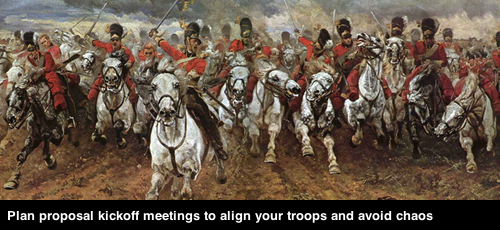Imagine a general assembling his field commanders and saying, “We’re going into battle tomorrow morning. I think we can win this. You and your soldiers know how to fight. Be ready at zero-eight hundred hours. That’s it. Dismissed.”
It doesn’t take military experience to know that such a briefing is a recipe for demoralization and defeat. The field commanders will have no strategy or story to rally their troops, no understanding of their tasks—and no faith they can carry the day.
Competent generals inspire their troops and show respect for their lives by carefully explaining the importance of the upcoming battle, laying out a detailed strategy for winning and providing clear instructions for each battalion’s role.
Be a better general
Large bid proposals are like extended battles (or small wars) without the blood. Your team will need to sacrifice their regular work—and likely some personal time—to create the response you need to win.
And, like soldiers, their reward will be the chance to do it all over again the next time an opportunity appears. No wonder proposal managers often feel alone in their enthusiasm.
The solution: Motivate and equip your team by being a better general. That starts with a carefully planned and well executed kickoff meeting.
Kickoff goals
Plan your proposal kickoff meetings to achieve three goals:
- Motivate: Make participants feel part of something bigger than getting a bunch of pages out the door. Why exactly is winning this opportunity important to the organization? Why do we think we can win? How will our senior leaders support the team?
- Inform: Satisfy the team’s hunger for information—especially inside information. Why is this purchase important to the buyer? What specific issues and features do evaluators care about most? Where is our solution strong? Do our competitors have an edge in any areas? What is our value proposition for each of the major sections?
In addition to the big picture, participants also need details: proposal framework, compliance items by section, workflow, deadlines, team organization and coordinates, etc. - Direct: Once team members have a sense of the mission, they need to know what to do next. Each participant needs detailed instructions outlining his or her tasks, including a completion date for each milestone. In addition participants need to be clear about team protocols—scheduled meetings, calls and other check-ins—and consequences if commitments are missed.
Kick-off preparation
Kicking off a major proposal properly takes careful planning and preparation. The next three posts explain the process, including:
- Proposal planning
- Kickoff participants and their roles
- Running the meeting
When we’re done, you and your troops will be fully prepared for every battle.


